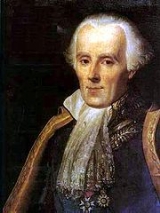
Pierre-Simon Laplace
Topics
Pierre-Simon Laplace
Quotations

Quotations
Pierre-Simon Laplace was a French mathematician and astronomer, discoverer of the Laplace transform and Laplace's equation.
----
----
----
----
----
----
----
----
Quotes
- "[Sire,] je n'ai pas eu besoin de cette hypothèse."
- De Morgan, Augustus (January 1872). Sophia Elizabeth De Morgan ed. A Budget of Paradoxes, London: Longmans, Green, and Co. As found in http://www-history.mcs.st-andrews.ac.uk/~history/Quotations/Laplace.html, accessed February 13, 2006.
- Translation: "[No, Sire,] I had no need of that hypothesis."
- Reputed reply to Emperor Napoleon I, who had asked why he hadn't mentioned God in his discourse on secular variations of the orbits of Saturn and Jupiter ("Mais où est Dieu dans tout cela?"/'But where is God in all this?').
- The exchange is reported by Victor Hugo (who in turn was citing Arago) as:
- "Comment, vous faites tout le système du monde, vous donnez les lois de toute la création et dans tout votre livre vous ne parlez pas une seule fois de l'existence de Dieu !"
- Translation: "How can this be! You made the system of the world, you explain the laws of all creation, but in all your book you speak not once of the existence of God!"
- Alternate translation: "You have written this huge book on the system of the world without once mentioning the author of the universe!"
- Alternate translation: "How is it that, although you say so much about the Universe, you say nothing about its Creator?"
- "[Sire,] je n'avais pas besoin de cette hypothèse-là."
- Translation: "I did not need to make such an assumption."
- Lagrange, also present (or to whom Napoleon repeated Laplace's reply, in another version), then commented: "Ah ! C’est une belle hypothèse; ça explique beaucoup de choses."
- Translation: "Ah! That is a beautiful assumption; it explains many things."
- Alternate translation: "Ah, but that is such a good hypothesis. It explains so many things!"
----
- From the Introduction to Théorie Analytique des Probabilités, second and later editions; also published separately as Essai philosophique sur les Probabilités (1814):
- "On voit, par cet Essai, que la théorie des probabilités n'est, au fond, que le bon sens réduit au calcul; elle fait apprécier avec exactitude ce que les esprits justes sentent par une sorte d'instinct, sans qu'ils puissent souvent s'en rendre compte." (Œuvres complètes de Laplace, tome VII, p. cliii, Paris: Gauthier-Villars, 1878-1912)
- Translation: "One sees, from this Essay, that the theory of probabilities is basically just common sense reduced to calculus; it makes one appreciate with exactness that which accurate minds feel with a sort of instinct, often without being able to account for it."
- Also reported as: "The theory of probabilities is at bottom nothing but common sense reduced to calculus; it enables us to appreciate with exactness that which accurate minds feel with a sort of instinct for which ofttimes they are unable to account."
- Or as: "Probability theory is nothing but common sense reduced to calculation."
----
- "Les questions les plus importantes de la vie ne sont en effet, pour la plupart, que des problèmes de probabilité."
- Translation: "Life's most important questions are, for the most part, nothing but probability problems."
----
- "La dernière chose que nous attendions de vous, Général, est une leçon de géométrie !"
- Translation: "The last thing we expect of you, General, is a lesson in geometry!"
- Laplace to Napoléon, after the latter had reported on some new elementary geometry results
----
- "?"
- Translation: "What we know is not much. What we do not know is immense."
- Allegedly his last words, as quoted in Augustus De Morgan's Budget of Paradoxes (1866).
----
- "?"
- Translation: "Man follows only phantoms."
- His true last words, according to Augustus De Morgan's Budget of Paradoxes (1866).
----
- "Lisez Euler, lisez Euler, c'est notre maître à tous."
- Translation: "Read Euler: he is our master in everything." (Although a more accurate translation would be: "Read Euler, read Euler, he is the master of us all.")
- Reported by Gugliemo Libri in the Journal des Savants, January 1846, p. 51: « ...ces paroles mémorables que nous avons entendues de sa propre bouche : "Lisez Euler, lisez Euler, c'est notre maître à tous". »
----
- "Nature laughs at the difficulties of integration."
- Quoted in I. Gordon and S. Sorkin, The Armchair Science Reader, New York, 1959.
----
- "Il est facile de voir que..."
- Translation: "It is therefore obvious that..."
- Frequently used in the Traité de mécanique céleste when he had proved something and mislaid the proof, or found it clumsy. Notorious as a signal for something true, but hard to prove.
Silverdale Interactive © 2026. All Rights Reserved.

